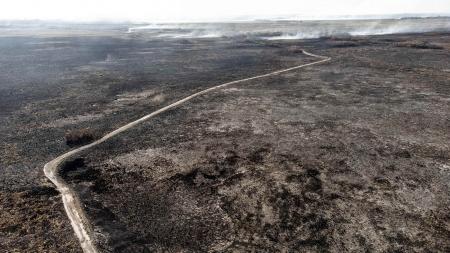The lack of rainfall and the high temperatures of the last few days further condition the yields of the main agricultural crops, which could lead to more cuts in the production forecast for the current campaign.
According to the Grain Exchange, this situation “continues to generate additional losses while 62.2% of the 16.2 million hectares of soybeans are defining yields.”
“If this scenario persists in the short term, the current production estimate of 33.5 million tons could register a new update”completed the entity in its Weekly Agricultural Panorama.
In the case of corn, he adds work, drought and heat “continue to affect the formation of yields.”
While the harvest of early corn squares progresses with yields below those initially projected, 31% of the late corn area is defining yields.
If this trend continues, the current projection of production of 41 million tons could record new changes, warned the Grain Exchange.
On the other hand, in grain sorghum, the rainfall below the averages of the last campaigns in a large part of the national agricultural area begins to lower the yield expectation, while the early frosts have also affected the lots in the west of the country.
the lowest volume
In its latest Monthly Estimate, the Rosario Stock Exchange (BCR) indicated that soybean production in the 2022/23 campaign would be 34.5 million tons, the lowest volume in the last 14 campaigns; and that of corn, 42.5 million.
And, in his latest Core Region Weekly Report, he warned that in soybeans, the cut is almost four million tons compared to a month ago, with one million hectares lost and an average yield drop from 24 qq/ha to 18, 2 qq/ha.
In February, late corn also collapsed, whose average yield went from 72 qq/ha to 48 qq/ha, the BCR completed.
For its part, in a previous study, the Grain Exchange had warned that, if the production estimates for soybean, corn and sunflower are maintained, and as a consequence of the effect of the drought, the drop in exports of grains and derivatives of the this campaign would reach US$ 9,975 million compared to the past cycle.
Meanwhile, for the technical team of CREA’s Agriculture Area, the losses this year would amount to more than US$ 20,000 million due to the drought and frosts that affected most of the productive regions.
This was estimated in his latest report based on a projected soybean harvest of 31.1 million tons and corn of 38.6 million tons, volumes that could be revised downwards in the coming weeks.
Government Policies
In his speech before the Legislative Assembly to inaugurate the 141st regular session of the National Congress, President Alberto Fernández mentioned “the concerns generated by a very severe drought that, to a greater or lesser extent, has been affecting the production of wheat, barley, soybeans and corn”.
Next, Fernández highlighted that “in the face of these climatic difficulties, the State has provided a set of instruments to support the most affected producers.”
Among them, the Government announced in recent days a line of credit for $4,500 million for affected small and medium-sized companies in the agro-industrial sectorexecuted by the Argentine Development Bank (BICE) and with a rate bonus from the National Agroindustry Trust Fund (Fondagro).
In its latest report, the Cereals Exchange warned that it continues to assess the damage caused by low temperatures and early frosts in soybean crops during mid-February.
“Sectors over the center of the agricultural area report loss of squares, abortion of pods and early completion of filling as a consequence of the high temperatures registered during this week,” the work specified.
In the Center-North and South of Córdoba and San Luis and the North of La Pampa-West of Buenos Aires, where 38.2% of the national total is concentrated, they expect losses of up to 50% with respect to the average yields of the last 20 campaigns.
And, to the north of the agricultural area, the implanted area has been favored by some pulses of humidity during the last weeks, but the high temperatures and the growing demand for the crop make new rains necessary in the short term.
In both sectors, the second-rate soybean fields are under a “water condition between regular and dry”; while 76% of the first class soybean fields are in a critical period with “depleted water reserves” and average temperatures above average.
below expectations
On the other hand, the lack of rain and the high temperatures recorded during critical stages for the definition of yields in early maize fields generated significant losses with reported yields below initial expectations.
Sectors such as the Center-North of Santa Fe and the Center-East of Entre Ríos report significant area losses and chopped squares as a consequence of the low expected yields.
A water condition between regular and dry, and the high temperatures recorded during this week, could generate additional losses than those initially expected, affecting the current production estimate in six out of every 10 hectares.
Rainfalls below the averages of the last campaigns in a large part of the national agricultural area begin to lower the yield expectation of the most advanced sorghum lots.
Despite this, the entity maintained the projection of production at 3,300,000 tons, 5.8% less than the previous cycle due to the fact that early frosts affected the lots in the west of the country and the rains are not enough in the most advanced.
On the other hand, the sunflower harvest advances and reaches 26.7% of the total area; With a national average yield to date of 15.6 quintals per hectare, the production projection remains at 3.9 million tons.
Even higher yields are expected: on the Center of Buenos Aires, 4% of the suitable area has already been harvested with an average yield of 24 qq/Ha, above the average yield of the last five campaigns (22.78 qq/ha).


















